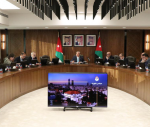You are here
The Arab Cold War
Jun 05,2017 - Last updated at Jun 05,2017
Over the last two decades, Qatar has become a problem for some Gulf countries. These countries had been simmering for some time and all of a sudden they were all brought to a boil.
Four Arab countries — Egypt, Saudi Arabia, United Arab Emirates and Bahrain — cut all diplomatic and economic ties with Qatar, thus deepening a rift that can no longer be ignored.
Qatar is accused of backing Iranian-backed militias, the Muslim Brotherhood and terrorism.
Al Jazeera — Qatar’s influential state-owned satellite channel — is also accused of supporting Hamas and the Muslim Brotherhood.
It “embraces multiple terrorist and sectarian groups aimed at disturbing stability in the region, including the Muslim Brotherhood, ISIS [Daesh] and Al Qaeda, and promotes the message and schemes of these groups through their media constantly”, the Saudi state news agency SPA said.
It is clear at this point that there is absolutely no love lost between the Egyptian president and the ruler of Qatar.
The two countries were locked in a dispute over Cairo’s accusation that Doha supports the banned Muslim Brotherhood.
The two waged a protracted media war that took its toll on both countries.
The other three Gulf countries have a hard time digesting what is seen as Qatar’s independent approach to various issues.
The Saudi and Emirati media outlets made it perfectly clear that Qatar is in collusion with Iran. They also argue that Doha’s current policies have only rattled the security and stability of the region.
While it is not clear yet if the anti-Qatar coalition has any hard evidence to substantiate the accusations made, one should not underestimate the gravity of the situation.
The announcement of a naval, air and land siege on Qatar is close to an act of war. It remains to be seen how Qatar is going to grapple with this unprecedented escalation.
And yet, one is struck by the timing of the whole episode.
It could be that Saudi Arabia feels emboldened after Donald Trump’s visit to Riyadh and the widespread perception that Saudis can settle an old account with Qatar with some impunity.
Or maybe Trump’s visit was not a factor and the escalation was inevitable, given the deepening rift between the two opponents.
This current crisis will push the region into a kind of Cold War. Without offering concessions, the two sides cannot work out differences.
The anti-Qatar coalition’s demands are tantamount to an ultimatum and the ruler of Qatar cannot meet them without losing face.
Thus far, no influential country has stepped in to defuse the tension.
The only American response was made by Secretary of State Rex Tillerson, who said that the two sides to the dispute need to hold talks to work out their differences.
Given that Qatar has few allies, Doha should rethink its approach and adopt a course of action that can ameliorate the huge pressure being put by the Saudi and their allies.
If the two sides fail to contain the situation and find a way out, the crisis will hit hard the region as a whole and Iran stands to gain.
It seems that the only power that can help deescalate the situation is the US. Hopefully it will do so before the worst is yet to come.













